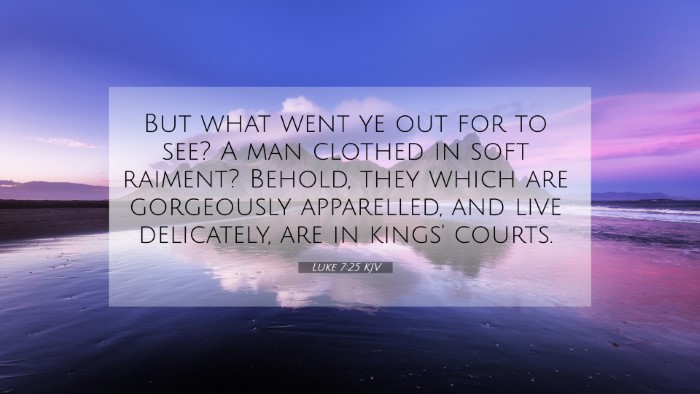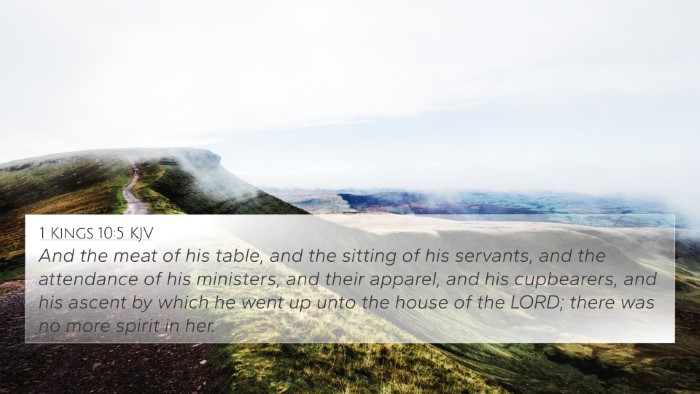Understanding Luke 7:25
Luke 7:25 states: "But what went ye out for to see? A man clothed in soft raiment? Behold, they which are gorgeously apparelled, and live delicately, are in kings' courts." This verse, spoken by Jesus, presents a critical inquiry into the expectations of John the Baptist’s followers regarding his identity and mission.
Verse Meaning and Interpretation
This verse challenges the preconceived notions of what constitutes greatness in the eyes of the world versus God. Below are insights drawn from various public domain commentaries:
- Matthew Henry's Commentary:
Henry elucidates that the query posed by Jesus serves to redirect attention from outward appearances to the true nature of God's messengers. John wasn't adorned in finery since he chose to live a life of simplicity and devotion, which starkly contrasts the opulence of worldly leaders.
- Albert Barnes' Notes:
Barnes interprets the verse as a necessary call to reconsider the characteristics of genuine prophets. He emphasizes that the important aspect is not the clothing but the message delivered by John, advocating for repentance and the coming of the Kingdom.
- Adam Clarke's Commentary:
Clarke highlights that Jesus points out that those who are dressed luxuriously live in palaces. John's lifestyle, therefore, was purposeful and a reflection of his mission to prepare the way for Christ, which draws attention to the humility and seriousness that should accompany spiritual pursuits.
Thematic Connections and Cross-References
Luke 7:25 relates thematically to several other scripture passages that highlight the contrasts between earthly values and divine priorities. Here are notable cross-references:
- Matthew 3:4: Describes John the Baptist's austere lifestyle, reinforcing the contrast with royal opulence.
- Luke 16:19-31: The parable of the rich man and Lazarus illustrates the differences between earthly wealth and spiritual reality.
- 1 Samuel 16:7: "For the Lord sees not as man sees; for man looks on the outward appearance, but the Lord looks on the heart." This principle underlines God’s perception of holiness versus man's superficial judgments.
- James 2:1-5: An admonition against favoritism based on appearance, emphasizing the importance of valuing faith over wealth.
- Philippians 3:19: A warning against those who set their minds on earthly things, contrasting worldly desires with spiritual pursuits.
- Romans 12:2: A call to not conform to the patterns of this world, thereby encouraging believers to seek transformation through spiritual renewal.
- Matthew 5:3: "Blessed are the poor in spirit," indicating that the humble are favored in the Kingdom of God.
The Importance of Cross-Referencing
Cross-referencing Biblical texts provides a nuanced understanding of sermons, personal studies, and theological discussions. Here are some tools and methods for effective Bible study:
- Utilize a Bible concordance to identify verses that share similar themes or words.
- Implement a cross-reference Bible study system that categorizes scriptures based on thematic or contextual similarities.
- Engage in a comprehensive comparative Bible verse analysis to explore connections and contrasts across different books of the Bible.
- Explore Bible cross-reference guides that systematically outline links between verses.
Conclusion
Luke 7:25 prompts a deeper reflection on the nature of true greatness and the requirements of those who serve God. By engaging with this verse and utilizing cross-referencing methods, believers can deepen their understanding and draw richer meanings from the Scriptures.














